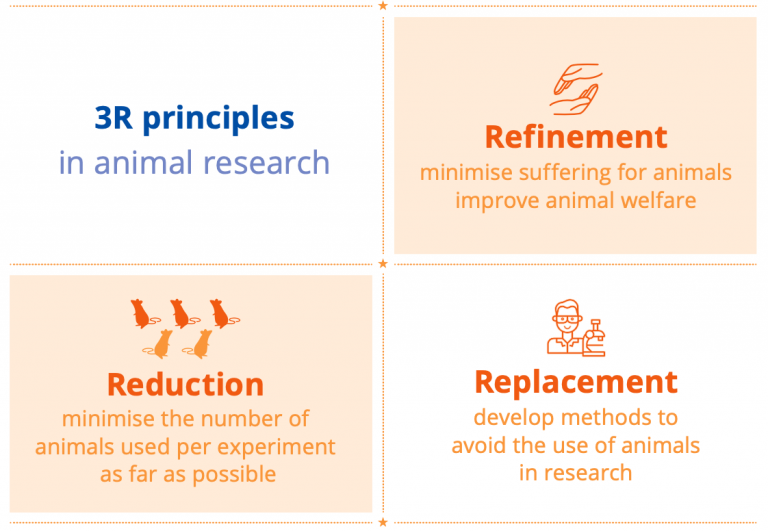Animal Welfare and Ethics
The health and welfare of the animals in our activities are of prime importance to INFRAFRONTIER consortium.

Animal Models for Human Diseases
The use of animal models to study human diseases is a major ethical concern in the current biomedical research landscape. Human disease conditions are often very complex due to disturbed interdependencies inside the human body rather than to the impairment of a single function further complicated by parameters like age and gender.
Despite rapid advancements in alternative in vitro models, holistic information about human disease conditions can only be obtained from the analysis of a whole organism. Mice are the most common and suitable models to mimic human disease conditions. The development, body plan, physiology and behaviour of the mouse are similar to that of humans, and more than 90% of the human genes have orthologues in the mouse. Results obtained from the analysis of mouse disease models allow valuable parallels with many debilitating and life-threatening human diseases.
INFRAFRONTIER supports the judicial use of experimental animals by archiving mouse stocks no longer required for ongoing experiments. The added advantage of this approach is that mouse models can be quickly recovered from the archive and distributed as frozen samples worldwide. In addition, cryopreserving mouse strains earlier in their development also protects live colonies from breeding failure, genetic contamination and other accidents and ensure that genetically identical mice can be distributed from ‘time stamped’ generations. This helps improve the reproducibility of the data generated from animal experiments
The 3R Principle
Developed over 50 years ago, the 3R principle (Replacement, Reduction and Refinement) were developed as a framework for performing more humane animal research. Ever since, these guiding principles have been incorporated into national and international legislation and regulations on the use of animals in scientific procedures, as well as in the policies of organisations that fund or conduct animal research. Read more about these important principles here

EMMA and Animal Welfare
Working with mutant models that are archived in EMMA has led to significant reductions in local breeding programmes – and to remarkable reductions in the number of animals used in the scientific process. Some mouse lines can be used to address several scientific questions, and once they are archived don’t need to be bred again. Experts estimate that EMMA and other repositories around the world have helped reduce the use of mice by hundreds of thousands over the last 20 years. Rapid improvements in cryopreservation technology and methods have allowed continuous refinement of animal conditions. Over the years, it has become possible to successfully deliver and re-derive frozen embryos or sperm to scientific users rather than live animals. This significantly lowers stress discomfort and other risks for the animals. In EMMA’s early days, just ten percent of shipments involved cryopreserved material; by 2020 this figure covers two thirds. The trend will continue in the years to come – thus avoiding needless stress and harm to animals.
INFRAFRONTIER and 3R
All INFRAFRONTIER partners apply the globally acknowledged 3R principles in animal research – replacement, reduction and refinement – in their daily work. Via INFRAFRONTIER, these principles have a large impact in considerably reducing the numbers of animals used in research – and will contribute to future efforts to replace animals where feasible.
Refinement
New standard operating procedures (SOPs) to avoid repeated blood sampling, more cryopreserved mouse strains shipped by the EMMA nodes, completely non-invasive and accurate imaging of body temperatures by new heat cameras – are some innovations at INFRAFRONTIER that add to the permanent improvement of conditions for animals used in research.
Reduction
The use of latest techniques and technology in our activities leads to a reduction of animals. For example, the recent advances in cryopreservation procedures and technologies have drastically reduced the number of mice needed to archive mouse strains. high-resolution imaging techniques can now show the details of the inner organs of a living mouse.
Replacement
Full digitalisation of data processing holds great potential for replacing mouse experiments in the future. Along with new software concepts based on machine learning and artificial intelligence (AI) will allow information archived in the EMMA database – already enriched with data from other mouse informatics resources – to be exploited more efficiently. In cooperation with EOSC-Life and other partners, INFRAFRONTIER drives the digitalisation of mouse phenogenomics to a new level.

